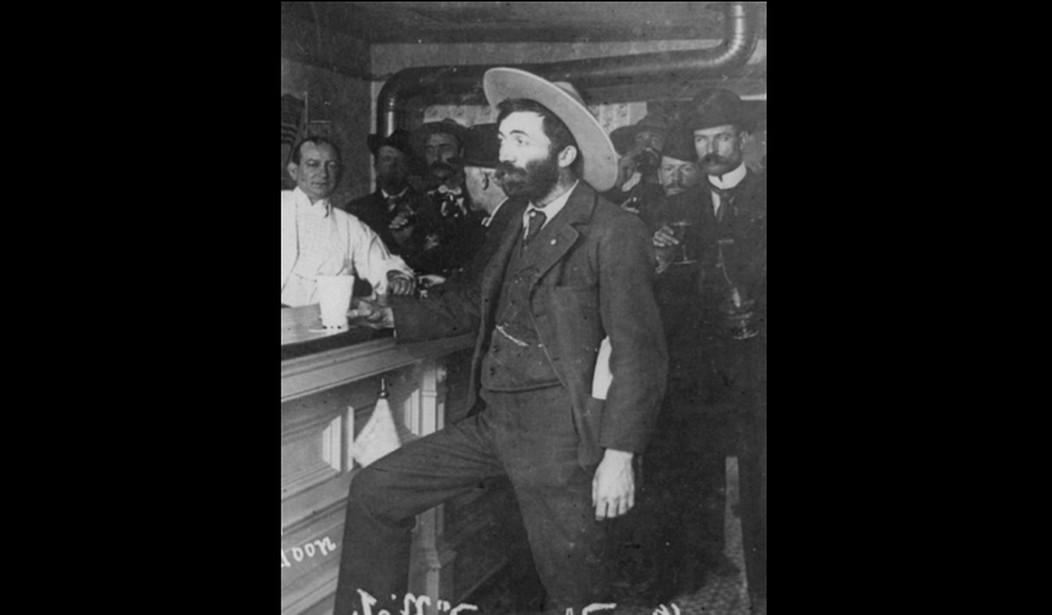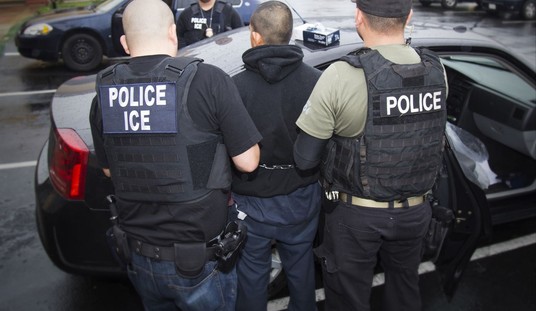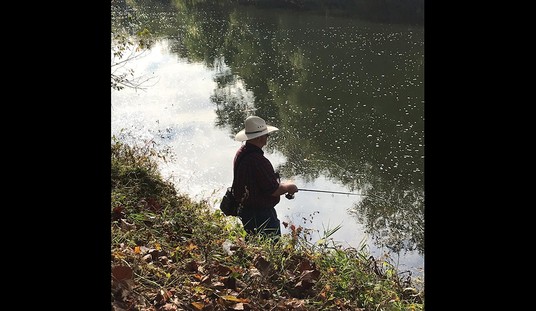The Founders, when they added the right to bear arms immediately after the right to free speech and freedom of conscience in the Bill of Rights, knew what they were doing. That amendment enshrined in the Constitution the citizen’s right to self-defense against criminals, predators (both two- and four-legged), and tyrants. Indeed, if there is one thing that sets a citizen apart from a subject, it is the right to keep and bear arms.
In today’s discussions on this topic, the pro-Second Amendment side (of which I am a member) tends to focus on the tyranny side of the equation, and that argument tends to have folks looking at the Imperial City as the source of that tyranny.
But that isn’t always the case. The Second Amendment protects us from local tyrants as well. Our history is replete with examples, but for the purposes of this discussion, let me describe one close to home, right here in the Last Frontier.
The tyrant in question is one Jefferson Randolph Smith, known as “Soapy” Smith. He was a con man and a gangster, and before coming to the Great Land he had bribed public officials, run confidence games, and extorted business owners in Texas and Colorado. When in Denver, as paid-off public officials looked the other way, he started the con game that gave him his nickname, selling bars of soap and claiming that prize money was concealed in some of the bars. After a hired shill bought one pre-selected bar and displayed currency taken from the packaging for all to see, the remainder of the non-currency-bearing soap bars would be sold to the highest bidder. While in Colorado, he also opened a saloon and casino, The Tivoli Club, and bought off the local constabulary to the point where Smith and his gangsters were effectively untouchable. But, eventually, things in the fast-growing city of Denver got too warm for Soapy Smith, so he decided to move to greener pastures.
This was the man that arrived in Skagway, Alaska Territory, in 1897, at the height of the Klondike gold rush.
Smith’s first attempt at establishing himself in the area failed. He and some cronies set up quickly along the White Pass Trail, running a series of three-card monte and shell games, designed to separate the miners from their gold. However, several (armed) “miner’s committees” intervened, encouraging Smith and his gang to leave the area. Smith left – for a while. He returned to Skagway in January of 1898 and quickly set about seizing control of the town.
Law enforcement in Skagway at the time consisted of one man, a deputy U.S. Marshal, who Smith quickly put on his payroll. While gathering reinforcements for his gang, he built a fake telegraph office – the telegraph did not actually come to Skagway until 1901 – and opened a saloon, “Smith’s Parlor,” including a variety of crooked gambling schemes designed to bilk miners of their gold. By mid-1898, Smith’s Parlor was known as “the real City Hall.” Miners returning down the White Pass Trail were met by one of Smith’s cronies and quickly steered towards a crooked game, a fake shipping company, or one of several other con games.
But Smith didn’t stop at conning miners out of their gold. Using the start of the Spanish-American War as a pretext, he raised a volunteer regiment with the approval of the War Department and President McKinley. Although Smith’s “Skaguay Military Company” went nowhere, Smith did march at the head of his private army in the parade through the town held on July 4th, 1898, after which he sat on the grandstand beside the Governor of the Alaska Territory for the rest of the patriotic celebration.
It seemed Soapy Smith had Skagway well in his grasp. But he had not reckoned on one thing: a group of armed citizens, determined to end his one-man rule. It was one egregious act of crooked gambling that tipped the scale.
Three days after the infamous Fourth of July parade, a miner named John Douglas Stewart came down to Skagway from the Klondike gold fields, carrying $2,700 worth of gold in a sack. When he reached Skagway, he was set upon by three of Smith’s gang, who convinced him to partake in a game of three-card monte.
After losing several hands in a row, Stewart began to suspect he was being cheated, so he refused to pay his “debt.” Smith’s three henchmen grabbed his sack of gold and ran. A newly formed vigilante group, the Committee of 101, remonstrated with Smith, demanding he return Stewart’s gold, but Smith refused, insisting Stewart had lost the money fair and square.
The next evening, July 8th, the Committee of 101 repaired to a storage house on the Juneau Wharf to discuss what should be done about Smith and his gang. They left four guards outside, only one of whom was armed. The armed man among the guards, Frank Reid, was carrying a .38 caliber single-action Colt revolver.
When Smith learned of the meeting, he picked up a Winchester rifle and went to break up the gathering. A Skagway resident, John Newman, saw Smith, determined where he was going, and followed. Smith, seeing Newman following him, shouted at him to stop where he was. Newman did not do so, but kept his distance, as he was armed only with a Colt revolver himself and did not want to engage against Smith’s Winchester at a distance. He did, however, witness what happened next, and gave his account of events years later to famed gun writer Elmer Keith.
According to Newman’s account, Smith approached Reid and started arguing, demanding admittance to the meeting. Reid refused, at which point Smith struck at him with the barrel of the Winchester. Reid drew his revolver and pulled the trigger, but the hammer fell on a defective cartridge. He re-cocked the single-action piece and tried again; he and Smith fired at the same moment. Smith was shot through the heart and hit the ground dead. Reid was hit in the groin and died twelve days later.
Thus ended the reign of Jefferson “Soapy” Smith. Over the next few days, his gang was rounded up, the three thugs who had robbed John Stewart were imprisoned and Stewart’s gold returned to him. Skagway was redeemed, in no small part through the efforts of the Committee of 101.
One might quibble with my labeling Soapy Smith as a tyrant, as opposed to a common thug. But I maintain the label applies; he was a thug, but not a common thug. Wherever he went he built an empire of fraud and robbery and paid off law enforcement officials to look the other way, and in Skagway, he effectively seized control of the entire town for a time – until removed by an armed citizen from a quickly formed vigilante group, which group was formed specifically to stop Smith’s depredations. Tyrants come in all shapes and sizes, and Soapy Smith in Skagway fits the description.
This is one of the situations the Second Amendment was intended to address.
Note that then, as now, Alaska had one of the highest rates of gun ownership in the United States. Here in the Great Land today, I can attest from personal experience that almost everyone keeps at least one gun around the place – at least, the people who live outside the Anchorage Bowl. Up here where we live, in the Susitna Valley, even the hippies have guns, not necessarily because we’re worried about tyrants lurking behind every birch tree but because there’s the possibility a moose might get fractious when we try to chase it away from our garden, or that a black bear might decide to take a foraging run in our kitchen.
Even so, one of the best ways I can think of to end up in the morgue hereabouts is to kick in someone’s door in the middle of the night. Home invasions in occupied dwellings aren’t really a thing up here, and it’s because such an attempt is a really, really good way to suddenly find oneself sporting a few new .45-caliber orifices.
So, what lesson can we draw from all this?
There are lots of places where someone like Soapy Smith could seize part or all of a city. If you have doubts about this, just look at what happened in Seattle in 2020, in the so-called “Capitol Hill Autonomous Zone,” ruled by “rapper” and thug “Raz” Simone. Aside from CHAZ’s lack of gambling parlors, it was a seizure of power that would have done Soapy Smith credit. Like Smith in Skagway, Simone evidently ruled the occupied portion of Seattle with a gang of armed thugs at his back.
Plus ça change, plus c’est la même chose.
Seattle, however, has no Committee of 101. Indeed, Seattle hasn’t recognized the existence of the Second Amendment in years. Look at any of our major cities today and you’ll see a lot of what characterized Skagway in 1898: corruption, little or no effective law enforcement, thugs preying on the citizenry with near impunity. But here, as in so many areas, Stein’s Law applies: What can’t continue, won’t. Soapy Smith’s tyranny in Skagway couldn’t have been allowed to continue. The current tyranny of thugs in our major cities can’t be allowed to continue. Citizens of this nation deserve to be secure in their homes and their persons, and in these cities today they most certainly are not. If we begin to see the formations of Committees of 101 in Chicago, Los Angeles, St. Louis, Baltimore, and a few other cities to straighten things out, it will come as little surprise.
Ward M. Clark hails from Alaska’s Susitna Valley, where he maintains his rural household in one of America’s last free places. He is a twelve-year veteran of the U.S. Army including service in Operation Desert Storm, and today is a focused minarchist libertarian, along with being an author, self-employed small businessman, woods bum, and semi-professional bad influence.”














Join the conversation as a VIP Member